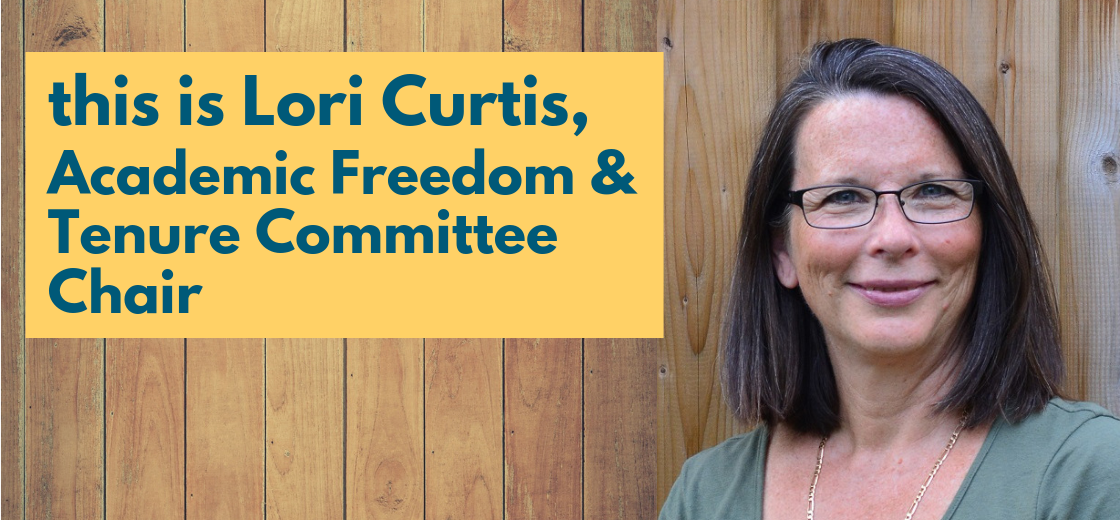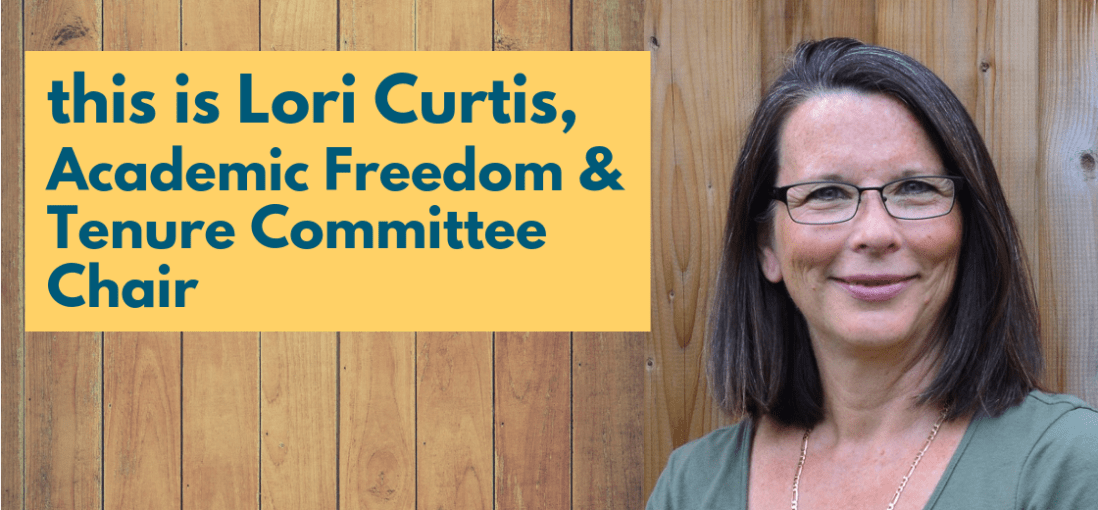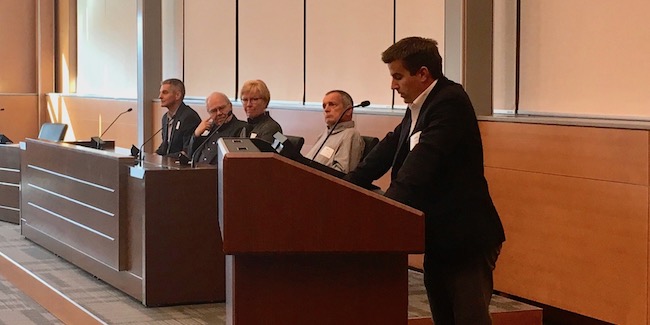David Porreca, FAUW president
It has been an extremely busy start to the Fall term. Now that we are at the mid-way point, it is time to provide you, dear reader, with an update as to what has been keeping us at FAUW on our toes over the past several weeks.
ADDS status
The task force on the Approved Doctoral Dissertation Supervisor status regulations is pursuing its work with a view to reporting to the Faculty Relations Committee and the Graduate Student Relations Committee in November. We are looking at solutions to ensure good graduate supervision that meets students’ needs while addressing the manifold concerns with how the current ADDS policy is communicated, applied and enforced. At FAUW’s request, the Provost’s Office has written to each individual faculty member who has been hired in the past 6 years to inform them of the current policy, and equivalent language has been included in employment letters for those colleagues hired this past year.
Since doctoral dissertation supervisors can belong to a number of different categories of faculty members (e.g., visiting, clinical, tenure-track, tenured at UW, hired with tenure from elsewhere), the eventual policy would need to be formulated in such a way as to address the issues relating specifically to each one.
New AF&T chair
I am very pleased to announce that our colleague Christopher Small from Statistics and Actuarial Science had kindly agreed to replace Peter Van Beek as the Chair of FAUW’s Academic Freedom and Tenure Committee when the latter ends his term of office at the end of August 2014. The AF&T Chair is a challenging position that can have an enormously positive impact on the careers of our members, and we at FAUW are very pleased that Christopher has expressed such keenness to take on the role.
Athletics
Our blog post from September 9 highlighted some of the issues relating to athletics that affect faculty members’ working environment. New concerns have come to light in the meantime:

- There is no controlled access to the change rooms (e.g., turnstiles), which is commonplace in most reputable athletics facilities.
- All staff members who dispense towels and oversee the (otherwise) uncontrolled access to the change rooms must walk through the men’s change room area in order to gain access to their office space.
- Upon examination of the floor plan of the PAC, it turns out that the female change room is about ½ the size of the men’s. Unless there is a demonstrable difference in usage rates between the two groups, this layout is evidently problematic from an equity perspective.
- A rough estimate sees 1/3 of the lockers in the men’s change room being broken and unusable, and another 1/3 being unused (those with the locks upside down). In other words, the space is under-used by a substantial margin. The lockers are in a deplorable condition, and we should all be grateful that campus ambassadors do not take visitors through the change rooms.
In light of the above, the Faculty Association is pushing for renovations to the PAC that would
- Restore separate change rooms for faculty and staff
- Replace the lockers with new equipment
- Maintain safe access to the emergency exits
- Ideally, address the concern over equity
If all groups of stakeholders – faculty (FAUW), staff (UWSA), graduate students (GSA), undergraduate students (Feds) and the university administration (via Athletics or the Provost’s Office) – could come together to fund such renovations, all the stated groups would benefit at a modest cost to each.
Also, feedback from female colleagues as to the state of the women’s change rooms at the PAC would be greatly appreciated. Please comment below or e-mail the FAUW president at dporreca@uwaterloo.ca.
Best practices in hiring
FAUW’s Status of Women and Equity Committee (SWEC) produced a 6-page report on “Best Practices in Hiring” for faculty members. This document has received endorsement by Deans’ Council and will be presented to the Executive Council of the university in late November. Recognition of the need for such a document at those high levels of university administration is an encouraging sign to be sure, as long as we eventually see proportional corresponding action.
Grad House memberships
Some of you have been asking about how faculty memberships at the Grad House work. Henry Ensley, manager of the Grad House, has written a letter explaining how it all works.
Instructor evaluations
FAUW is being consulted on what shape we would like to see course evaluations take in the future. Discussions will include student representatives and qualified staff from CTE. If you have strong feelings or ideas you’re willing to share about course evaluations, please comment below or e-mail the FAUW president at dporreca@uwaterloo.ca.
OCUFA Queen’s Park Lobby Day
UW’s Kate Lawson (OCUFA President) and David Porreca (FAUW President) met with four local MPPs on Wednesday 23 October at Queen’s Park: Ted Arnott (PC – Wellington–Halton Hills); Catherine Fife (NDP – Kitchener–Waterloo); Rob Leone (Cambridge) and Hon. John Milloy (Kitchener Centre). We had four basic messages to deliver to our representatives:
- That the province needs to fund an independent study on the working conditions of contract academic staff across the province in order to help resolve long-standing concerns about their job precariousness, lack of real academic freedom and potential for exploitation.
- That the province needs to provide temporary solvency relief to university sector pension plans for those institutions that need it. We had been asking for a 1-year extension of such relief in order to give enough time to OCUFA to complete its study on university-sector pension plans. Much to our relief, however, in the middle of our meeting sessions, news came out that the province had granted a 3-year window of solvency relief.
- That the province needs to restore funding to its faculties of education. This question did not concern UW as much, so I shall not belabour it here.
- That the province need not incentivize differentiation between universities in the province because institutions of higher education are already plenty differentiated as it is, from small liberal arts colleges to the University of Toronto, with UW standing out – among other things – for its long-standing commitment to the co-op stream and for having a full Faculty of Mathematics.
Our messages were well-received, in particular, the first point, with members from all three parties agreeing to request such a study from the Minister of Training, Colleges and Universities.
Scheduling
FAUW is anxiously awaiting the results of the latest simulation of the new scheduling system, as discussed in last week’s post by Bryan Tolson.
Senate bylaws
The Secretariat has announced plans to undertake a full-scale revision of the Senate bylaws. The first phase of this initiative is restricted to housekeeping changes, but revisions to Section 5 (selection of members of the Senate) are being left for last as they are more likely to be substantive. These revisions require great vigilance to ensure that nothing deleterious to our working lives as faculty members happens as a result of the proposed changes. Faculty senators are encouraged to exercise active vigilance when these documents become available for consideration.
UW’s numbered policies
The Secretariat is also undertaking a full-scale multi-phased revision of all 69 of UW’s numbered policies (still listed as 1-77, with some gaps). The first phase will involve housekeeping changes (e.g., regularizing and updating the names of buildings and offices that are mentioned in the policies), but later phases will also involve substantive changes. Through the Faculty Relations Committee, the approval of the Faculty Association will be necessary for any changes that are to be made to Class F, FS and A policies. FAUW plans to devote substantial time and energy to make sure that any changes are favourable to faculty members’ interests. The numbered guidelines and procedures will also be subject of an eventual analogous revision.
Work-Life Balance Report update
The joint FAUW/Provost’s Office Work-Life Balance Report that was presented to Senate back in February 2013 is becoming integrated purposefully into the “Value System” focus area of UW’s newly released (but-not-yet-fully-Senate-approved) Strategic Plan. FAUW’s Status of Women and Equity Committee produced a “Compassionate Care and Bereavement Leave” report that will be considered in conjunction with the WLB report at the same level.
Event reminders
Please mark your calendars for the following events:
Privacy Colloquium: Wednesday, December 4, 2 – 5 in M3 1006, with reception to follow.
Fall General Meeting: Monday, December 9, 11-1, Location TBA. Light lunch provided



